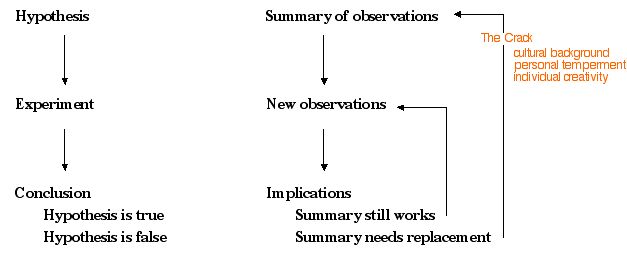Serendip is an independent site partnering with faculty at multiple colleges and universities around the world. Happy exploring!
Science Education (and Science) as Conversation
Science Education (and Science) as Conversation
A project of the Lansdowne Friends School and the Bryn Mawr College Center for Science in Society
with support from the Howard Hughes Medical Institute
with support from the Howard Hughes Medical Institute
Inquiry Day, 18 October 2008
Scientific Method and Its Implications
| "Traditional" science | Science as "open-ended transactional inquiry" |

|
|
| Science as a body of facts established by specialized fact-generating people and processes | Science as an ongoing process of getting it less wrong, potentially useable by and contributed to by everyone. |
| Science as successive approximations to "Truth" | Science as ongoing story telling and story revision: repeated making of observations, interpreting and summarizing observations, making new observations, making new summaries ... individually and collectively |
| Science as authority about "natural world" | Science as skepticism, a form of inquiry that can be used for anything, one which everybody is equipped to to/can get better at/be further empowered by, and contribute to - a way of making sense of what is but even more of exploring what might yet be |
Teaching science as open-ended transactional inquiry
| "science is much more than its technical details .... We must embark on a cultural shift that places science in its rightful place alongside music, art, and literature as an indispensable part of what makes life worth living ... We rob science education of life when we focus solely on results and seek to train students to solve problems without a commensurate emphasis on transporting them out beyond the stars." ... Brian Greene, New York Times, 1 June 2008 |
- Focus on process rather than on content
- Use content to motivate process
- Begin with what's on the minds of students, with what students think they understand and with as yet unanswered questions (whether answerable or not)
- Encourage both observation and story creation in relation to those questions
- Bring in new observations that both speak to questions and challenge existing understandings.
- Emphasize the community process, the use of additional observations and alternative interpretations, from both within the class and beyond it.
- Integrate science with other human activities rather than treating it as distinct from them.
- Help students come to see science as an ongoing and exciting process of discovery and creation, one that they can both draw from and contribute to.
For further exploration ...
- Thinking About an Elementary Science Education Curriculum
- Introductory Science Education
- Exploring Science as Open-ended Transactional Inquiry
- Inquiry Education in Science (and Elsewhere)
- Science/Inquiry: Exploring Eggs
- Education: Between Two Cultures
- Put a Little Science in Your Life, Extended
- Science as Story Telling in Action
posted by Paul Grobstein, 17 October 2008



Comments
Post new comment